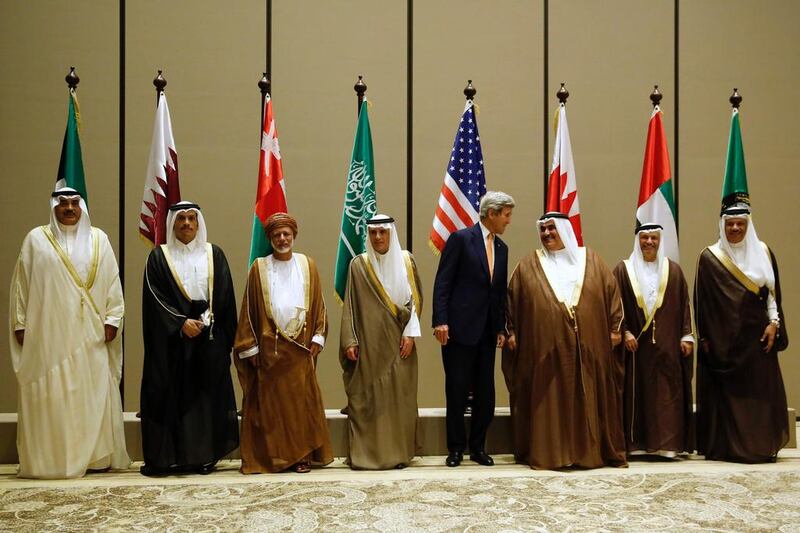ABU DHABI // In the run up to Barack Obama’s summit with Gulf Arab leaders later this month, US and Gulf officials will discuss the possibility of a GCC security partnership with Nato, as well as “economic transformation” in the region, US secretary of state John Kerry has said.
Mr Kerry met with his GCC counterparts in Manama on Thursday evening to lay the groundwork for Mr Obama’s talks with Gulf leaders in Saudi Arabia on April 21. The Saudi talks come a year after the Camp David summit convened by the US president last May to reassure Gulf leaders about the Iran nuclear deal and agree on areas of strengthened security cooperation.
Following the summit, the United States and GCC formed working groups that have met during the past year to enhance cooperation on integrated GCC ballistic missile defences, maritime and cyber security, counterterrorism and military preparedness and a streamlined process for defence sales.
“Today we exchanged thoughts about the progress being made through these working groups and discussed ways that we can actually achieve greater gains in the months ahead,” Mr Kerry said at a press conference with the Saudi foreign minister.
Ahead of last year’s Camp David summit, Gulf officials had hoped for a Nato-like binding security pact with Washington, but such an agreement was always highly unlikely. Now, the US is willing to discuss increasing cooperation between Nato and the GCC, though officials gave no further details on what was being considered.
Mr Kerry said Washington had agreed with GCC foreign ministers to “begin the process of evaluating whether or not the concept of a GCC-Nato partnership in specific terms is something that would contribute significantly to the security and stability of the region”.
“That analysis will go on over the course of the next days,” he added.
A new working group between Washington and the GCC will also be formed on the challenges facing Gulf economies at a time of low oil prices, Mr Kerry said.
“We agreed that it would be important given the transformation taking place not just in the region but globally with the price of oil and other challenges economically to have a major new component of [the US-GCC dialogue], which is economic transformation,” he said.
Much of Mr Kerry’s meetings in Bahrain centred on Iran’s role in the region. Most GCC countries consider Tehran to be their gravest security threat, and are concerned about US intentions towards Iran in the wake of the nuclear deal and as Iran appears to be increasing its involvement in the Middle East.
Despite the Obama administration’s hope that the nuclear deal will empower moderates within Iran, Tehran has provocatively carried out a number of ballistic missile launches and continued or increased its involvement in the wars in Syria and Yemen.
Recent remarks by Mr Obama have only reinforced fears that the US intends to play a more neutral role in the region and do less to contain Iran. Gulf countries and Iran must "find an effective way to share the neighbourhood", the US president said in a recent interview with The Atlantic magazine.
In his public statements on Thursday, Mr Kerry worked to address Gulf concerns, while also giving some praise to Iran for adhering to the nuclear deal and calling on it to do more to help find solutions to regional conflicts.
“Today we talked about how if Iran is going to give meaning to the words that were issued by its president in the last days about not being a threat to people in the region and wanting to work with people, the place to begin is by supporting the effort that we are engaged in to make peace in Yemen, not provide more weapons to Yemen and continue to fuel the conflict,” Mr Kerry said.
US, British and French naval ships have in recent weeks intercepted four shipments of arms from Iran that officials say were bound for Houthi rebels in Yemen.
But Mr Kerry also used unusually strong language to describe US frustration with Yemen’s president ahead of peace talks between the Yemeni government and the Houthis and their allies slated for April 18. On Sunday, Abdrabu Mansur Hadi fired deputy president and prime minister Khalid Bahah as internal fissures within the government opened publicly.
“I cannot avoid saying that I think that president Hadi has complicated some of those efforts significantly in the last few hours,” Mr Kerry said during remarks with his Bahraini counterpart on Thursday. “And I hope that decisions will be made that will facilitate our ability to be able to move towards the negotiations that we have all been working towards.”
foreign.desk@thenational.ae





